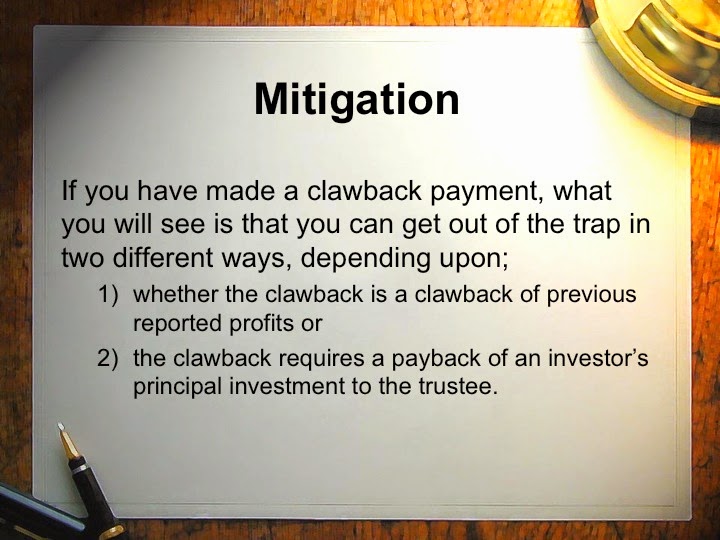Three years after the publication of the revenue ruling and the revenue procedure, in late 2012, as more and more clawbacks began to surface, the IRS provided some guidance for the taxation of clawbacks in a publication by the IRS entitled “frequently asked questions (F.A.Q.)”, related to ponzi scenarios for clawback treatment.
The information was posed as two questions and answers.
Question 1: How does a taxpayer treat the repayment of a clawback?
Answer: Clawback repayments of amounts previously reported as income from a ponzi scheme are not additional theft loss deductions. Instead, they are repayments of claim of right income that result in either a deduction as a non theft investment loss, or a credit calculated under [the mitigation section] whichever results in lower tax.
A theft loss deduction from a ponzi scheme is not a deemed repayment of ponzi income that is eligible for the mitigation section . . . however, an actual clawback repayment is not a theft loss deduction and section 1341 treatment is not barred.
[The mitigation] . . . applies and the taxpayer would compute the tax for the year of the clawback payment (the clawback year) under two methods:
The F.A.Q. Then proceeded to show how to do the alternative calculations to use the claw back of profits either as a
deduction in the year of payment
or exclusion in the year the clawed back income was earned.
Method 1: figure the tax for the clawback year claiming a non-theft investment loss deduction for the clawback payment. It is not a capital loss and it is not subject to the 2% floor on miscellaneous itemized deductions.
Method 2: figure the tax for the clawback year with a credit computed as follows:
- Figure the tax for the clawback year without deducting the repaid amount.
- Refigure the tax for the year the clawed back income was originally reported (the income year) without including in income the amount of the clawback payment.
- Subtract the hypothetical tax for the income year in (2) from the actual tax shown on the return for the income year. This is the section 1341 credit.
- Subtract the answer in (3) from the tax for the clawback year figured without the deduction (step 1).
The taxpayer is entitled to the benefit of either the deduction under method 1 or the credit under method 2, whichever results in less tax (or a greater refund) for the clawback year. Note that the section 1341 credit is a refundable credit.
Question 2: What does the taxpayer need to establish as to whether the repayment of a clawback is allowable as a deduction (or a section 1341 credit)?
Answer: usually a settlement agreement will have been entered into. The taxpayer has to establish that the clawback amount was required to be repaid to the trustee. The taxpayer would also have to substantiate that payment was made. The substantiation could include a letter from the trustee.
The F.A.Q. did not publish any materials on the tax treatment of the clawback of principal.
As a practical matter, any settlement agreement that is being reached in a ponzi scheme should include language to clarify the item being clawed back, the amount of the clawback and other tax issues. Tax counsel prior to finalization should review settlement agreements involving a clawback.
Though nothing has been published, the service has considered the issue of the treatment of a clawback that results in a taxpayer’s loss of the investor’s principal investment in the ponzi scheme.
Now is when our knowledge of the theft loss must again come back into play.
Late in may I spoke with an attorney with the chief counsel’s office of IRS he was very familiar with the F.A.Q. and advised me in no uncertain terms that the service position was to treat ponzi scheme principal losses that result from a clawback, in the same manner as the principal losses suffered by original investors. (i.e., those victims who invested principal and lost their principal funds when the Ponzi scheme was bankrupted).
This in fact means that IRS position is to permit the loss of principal in a ponzi scheme as a theft loss whether it is paid directly or as a result of a clawback.
Several aspects of the law support the IRS position. The IRS has confirmed in its revenue ruling 2009-9 that investors in ponzi schemes are engaged in a “transaction entered into for profit” and entitled to “sole proprietorship” treatment for purposes of the net operating loss rules under code section 172.
The IRS F.A.Q. ruled that the clawback of income was entitled to be treated as a loss resulting from the transaction and the IRS has ruled that the loss of principal is unlike the loss of profits because there is no “repayment of income”, such as we had in the clawback of profits.
Therefore, the principal lost in a clawback is not entitled to use the mitigation section for its losses.
Certainly, there is a loss as a result of a clawback of principal. This loss of principal, whether it be lost as part of the direct ponzi scheme loss or whether it be lost as a result of a clawback that forces the taxpayer to replace principal previously withdrawn, are both treated identically. Losses are both incurred directly as a result of investing in a ponzi scheme. Ponzi losses of principal and profits are both treated as ordinary losses.
This is an excerpt from the full length presentation "Taxation of the Clawback in a Ponzi Scheme & Maximum Tax Recovery", by Tax Attorney, Richard S. Lehman Esq.







